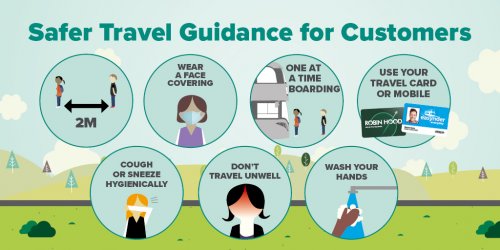Following the publication by the Department for Transport (DfT) of its Safer Travel Guidance for Passengers, many operators are preparing for an upturn in passenger numbers as more people return to work.
South Wales-based NAT Group has reassured the pubic that it is ready this, having been running reduced services since the ‘Stay at Home’ message was first announced in March, as well as free travel for key workers. NAT Group was among the many operators to introduce a temporary ‘no cash’ or ‘exact fare’ policy for the safety of it’s employees.

However, as passenger numbers look likely to rise, NAT Group Managing Director Adam Keen has warned that the new restrictions are putting huge financial pressures on the sector. Adam said: “The safety of our customers and staff will always be our priority and we are complying with all requirements the government has asked of us, however, it has been incredibly hard to get hold of PPE, with many bulk orders understandably being diverted to the NHS. Social distancing will mean much lower passenger numbers and a lightly loaded bus is generally loss-making for the company. Putting more buses on to cope with additional passenger numbers is going to be very difficult financially. We, and other operators, are now in regular discussions with Welsh Government officials to try and secure stimulus funding to support us through this very difficult period of time. While we have been able to continue to provide our essential service up to now, but the most difficult period is still to come, and funding for the recovery will be crucial.
“Going forwards, we will endeavour to meet the aspirations of our passengers who want to be able to travel, whilst also working on restoring passenger confidence once lockdown ends so that the bus remains a viable, good value alternative to the car.”
Nigel Featham, Managing Director of Go North West, also stressed the importance of restoring passenger confidence after the success of the stay at home message.
“The Prime Minister’s advice – ‘Don’t use public transport’ – started our week with a jolt,” he said. “While such guidance is intended to safeguard people on the verge of returning to work or school, here at GNW our livelihoods are at stake if this message sticks in the public’s minds once the peak of the current pandemic has passed.
“Despite sensational stories of overcrowded buses and tube carriages in London over the past few days, here in Greater Manchester we have seen little noticeable increase in ridership. But this is likely to be the calm before the storm.
“Last week I reported how we were all geared up to getting back to a full schedule, although one with numerous restrictions in place. June 1st is the favourite date ringed in red on the calendar at this point, so stand by for lots more information next week.
“But it’s equally important that we communicate clearly with our passengers too. At GNW we’ll be promoting a ‘Do’ message rather than a ‘Don’t’ one: DO travel only when it’s vital, DO plan your journeys, DO wait if buses are full, DO use contactless or exact change, DO observe one-on-one-off boarding, DO travel after 9.30am if you’re a concessionary pass holder. We’ll be going all out on the comms front to drive these positive messages home.”
Nigel went on to say that the operator will not ask drivers ‘to act as judge and jury with passengers who insist on seeing themselves as exceptions’.
Nottingham City Transport (NCT) re-iterated government advice and reminded passengers that although Public Health England recommends trying to keep 2 metres away from people, where possible, as a precaution, this is not a rule and the science is complex. “The key thing,” the company said in a press release, “ is to not be too close to people for more than a short amount of time, as much as you can. There are situations where this may not be possible, for example when boarding or alighting, on busier services, at busier times of day, when walking through bus stations and interchanges.” It urged passengers to wear a face covering when using public transport and reminded people to still only make necessary journeys, and those who may be vulnerable or shielding to stay at home, as well as those who are experiencing any coronavirus symptoms.

